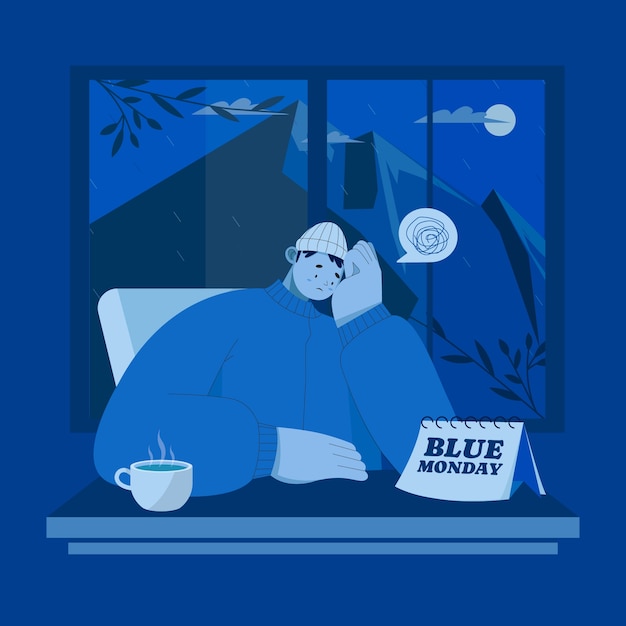<h1>Blue Monday: Is It Time for HR to Dismiss the Most Depressing Day of the Year?</h1>
<p>Every January, as the holiday season gives way to the bleakness of winter, many people experience what has come to be known as “Blue Monday.” This dreaded day, claimed to be the most depressing of the year, typically falls on the third Monday of January. The combination of cold weather, dark days, and the emotional and financial hangover from holiday festivities often creates an atmosphere ripe for negativity. However, is there any truth to the notion of Blue Monday, or is it simply a myth born from creative marketing?</p>
<p>In this article, we will explore the origins of Blue Monday, the psychological impact of January on employees, and actionable strategies that HR teams can implement to help their workforce navigate this challenging period. We aim to equip HR professionals with the insights necessary to uplift team morale during a time that can be especially tough for many.</p>
<h2>The Myth of Blue Monday</h2>
<p>The concept of Blue Monday was popularized by a press release from Sky Travel in 2005. The press release introduced an equation intended to determine the most depressing day of the year. While it generated considerable public interest, the science behind it was scant at best. Cliff Arnall, a lecturer at Cardiff University, was initially credited for this so-called formula, but it was later revealed that the equation was primarily a marketing gimmick crafted by a public relations agency. Arnall himself later sought to debunk this myth, asserting that the idea of a single day where everyone is uniformly unhappy is unfounded.</p>
<p>Despite being rooted in marketing hype, many individuals genuinely struggle with mental health as the new year begins. According to the Mental Health Foundation, nearly 1 in 6 people experience common mental health issues including anxiety and depression at any given time, meaning that January could indeed exacerbate these feelings for some individuals. The realities of the cost-of-living crisis, ongoing uncertainties, and seasonal affective disorder (SAD) make January feel even more daunting.</p>
<h3>Employee Wellbeing: A Growing Concern</h3>
<p>Understanding the psychological effects of January is essential for HR professionals, especially if they aim to maintain workforce morale. A dip in employee engagement can hinder productivity, and mental health issues can lead to increased absenteeism. Therefore, supporting employees during this challenging period should be a priority for organizations.</p>
<h2>Strategies for HR to Combat Blue Monday</h2>
<p>Here are several proactive strategies that HR teams can adopt to counteract the negative vibes associated with Blue Monday and the winter blues.</p>
<ul>
<li><strong>Encourage Social Connections</strong>: Promote informal catch-ups among employees, either virtually or in person. Organizing casual gatherings can rekindle the social fabric of the workplace, especially for remote workers who might feel isolated. Encourage teams to engage in non-work-related discussions to foster connections.</li>
<li><strong>Promote Time Off</strong>: Remind employees about their holiday entitlements. Keeping your HR system up-to-date ensures that staff are aware of their benefits. Allowing employees to take time off, even for a staycation, can provide them with the necessary mental break to recharge.</li>
<li><strong>Offer Positive Feedback</strong>: At the beginning of the year, reinforce a culture of recognition and appreciation. Encouraging managers to provide regular positive feedback can significantly improve employee morale. When employees feel valued, they are more likely to be engaged and productive at work.</li>
<li><strong>Highlight Purpose and Impact</strong>: Help employees understand how their roles contribute to the organization’s success. Providing clarity on this can instill a sense of importance among employees, reducing feelings of insignificance and fostering a more connected workplace culture.</li>
<li><strong>Initiate Mental Health Discussions</strong>: Use the Blue Monday conversation as a springboard to discuss mental health. Enhance company strategies towards wellness by integrating mental health resources in the HR portal, providing management training on mental health awareness, and considering appointing mental health first aiders within teams.</li>
<li><strong>Flexible Working Arrangements</strong>: For many, the winter blues can stem from Seasonal Affective Disorder (SAD). Consider introducing flexible working hours or remote working options during January. Allow team members to start later if needed or provide time off during particularly challenging days.</li>
</ul>
<h2>Leverage External Resources</h2>
<p>Numerous organizations and charities provide valuable resources for mental health. One such resource is <a href=’https://www.mind.org.uk/’ target=’_blank’>Mind</a>, a mental health charity that offers support and information on various mental health topics. Encouraging staff to utilize these resources can help them navigate their feelings during a time when they may need extra support.</p>
<p>Moreover, organizations may consider collaborating with external mental health professionals for workshops and training sessions focused on building resilience and providing tools to manage stress effectively.</p>
<h2>Conclusion: A New Approach to Blue Monday</h2>
<p>As we reflect on Blue Monday, it’s crucial to recognize that while the day itself may be a myth, the feelings it represents are very real for many individuals. HR teams have a unique opportunity to foster a supportive environment that prioritizes mental health and employee wellbeing. By embracing proactive strategies, organizations can not only combat the January blues but also create a more engaged and resilient workforce all year round.</p>
<p>Let us work together to build a culture that recognizes the importance of mental health, encouraging open dialogues and support systems that allow employees to thrive, even during the darker months of the year.</p>
<p>—</p>
<p>Paul Bauer is the Head of Content at Cezanne. Based in the Utopia of Milton Keynes, he has over four years of experience in employee benefits, engagement, and HR sectors. He has received multiple industry awards for his contributions, including the prestigious Roses Creative Award.</p>
Blue Monday: Time for HR to Dismiss the Myth?
·


Leave a Reply